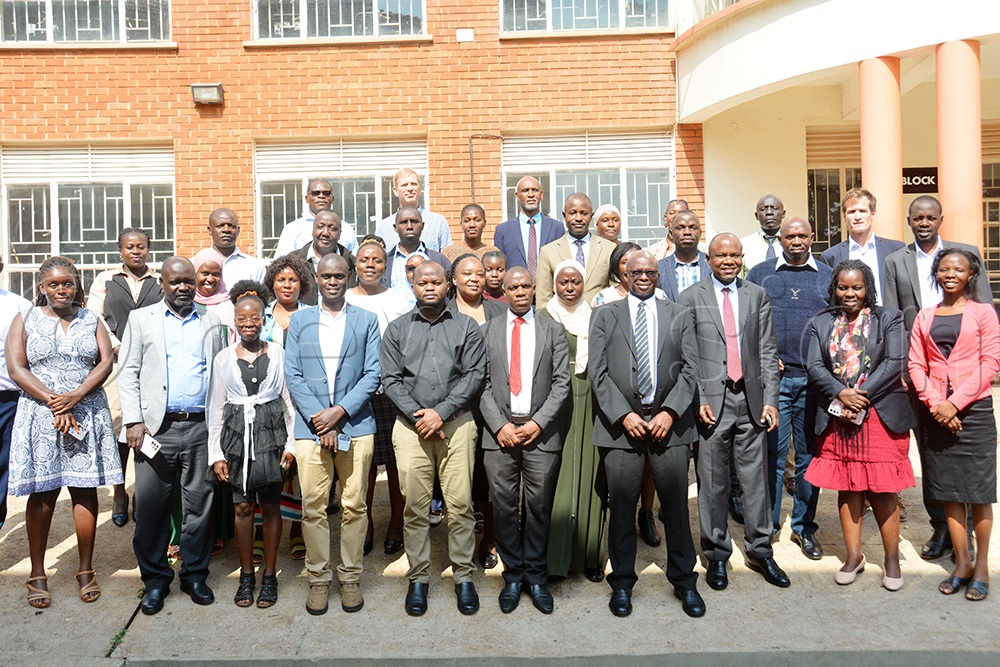Registration without incentives won’t grow businesses in Uganda, experts warn
The study conducted by scholars from Makerere University, Copenhagen Business School, and the Uganda Small Scale Industries Association (USSIA) found that formalisation must be supported by targeted reforms, government incentives, and strong backing from business associations and civil society if it is to deliver green and inclusive growth.
Prof. Marcus Lasrsen from University of Copenhagen addressing participants during the dessimnation of research findings on informal sector at Makerere University in Kampala. (Photo by Francis Emorut)
By John Odyek
Journalists @New Vision
_____________________
Business and tax registration alone are not enough to secure the survival, growth, or sustainability of firms in Uganda, according to new research that has been released.
The study conducted by scholars from Makerere University, Copenhagen Business School, and the Uganda Small Scale Industries Association (USSIA) found that formalisation must be supported by targeted reforms, government incentives, and strong backing from business associations and civil society if it is to deliver green and inclusive growth.
Titled “Firm Formalisation and Sustainable Development,” the study was launched on August 28, 2025, at Makerere University Business School. Uganda’s economy, which employs 78% of the working population, remains highly informal, characterised by low productivity, limited worker protection, and environmentally harmful practices.
While formalisation is often promoted as a pathway to sustainable development, the report shows that simply registering or taxing firms does not automatically translate into responsible business practices.
Surveying 1,100 small-scale firms across Uganda since 2022, the researchers discovered that outcomes vary depending on the type of registration.
Makerere University College of Business and Management Science officials and Uganda Small Scale Industries Association officials posing for a group photograph with participants and Prof Marcus Lasrsen (second right back row) during the dessimnation of research findings on informal sector at Makerere University. (Photo by Francis Emorut)
Business registration through the Uganda Registration Services Bureau (URSB) boosts legitimacy and improves some business practices, but shows little impact on labour standards or environmental outcomes.
Tax registration with the Uganda Revenue Authority (URA), though initially resisted, delivers the strongest gains helping firms improve management, labour standards, and eventually environmental practices.
Local government licensing, however, was associated with weaker or even negative outcomes, highlighting an urgent need for reform.
“Formalisation can drive sustainable development, but only when paired with incentives, capacity building, and targeted reforms,” said Prof. Marcus M. Larsen, the study’s lead investigator.
Larsen noted that while Europe has low levels of informality due to mandatory pre-startup registration, Uganda and Sub-Saharan Africa face high informality levels with 80–90% of employment being informal.
“We need a just transition from informality to formality to address environmental degradation, climate change, and widespread economic and social challenges. Formalisation alone is not enough there must be tax incentives, training, and tangible payoffs for firms prioritising sustainability,” Larsen said.
The researchers recommended several reforms, including integrating environmental and social standards into URSB registration, offering URA tax rebates for firms adopting waste management systems, strengthening labour rights alongside environmental protections, supporting firms with audits, coaching, and certification through UMA, UNBS, and NEMA.
Others are promoting youth-led and agro-based green innovation, advancing women’s leadership in enterprise, building fair and green tax systems.
Prof. James Wokadala, the deputy principal of the College of Business and Management Sciences, said the research contributes to the global agenda of inclusive development.
Wokadala commended the international research team and their use of randomised control trials, calling it “a model for impactful policy-oriented research.”
USSIA director Veronica Namwanje highlighted the challenges facing small firms, many of which collapse before their first anniversary.
“There is a false perception that business registration alone guarantees success. Supporting small firms with the right incentives and structures can significantly benefit the economy,” Namwanje explained. The study was funded by the Independent Research Fund Denmark.
